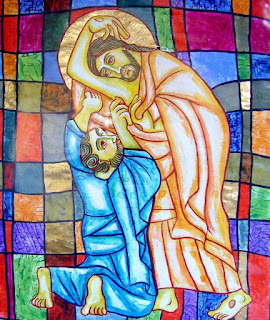Easter 3 C + Do You Love Me? 5.1.22

M. Campbell-Langdell All Santos, Oxnard ( Acts 9:1-6, (7-20) ; Psalm 30 ; Revelation 5:11-14 ; John 21:1-19 ) When they had finished breakfast, Jesus said to Simon Peter, "Simon son of John, do you love me more than these?" He said to him, "Yes, Lord; you know that I love you." Jesus said to him, "Feed my lambs." A second time he said to him, "Simon son of John, do you love me?" He said to him, "Yes, Lord; you know that I love you." Jesus said to him, "Tend my sheep." He said to him the third time, "Simon son of John, do you love me?" Peter felt hurt because he said to him the third time, "Do you love me?" And he said to him, "Lord, you know everything; you know that I love you." Jesus said to him, "Feed my sheep.” There is so much in today’s scriptures that one could preach on. In the gospel alone there are numerous places from which to launch off in various directions. But as





